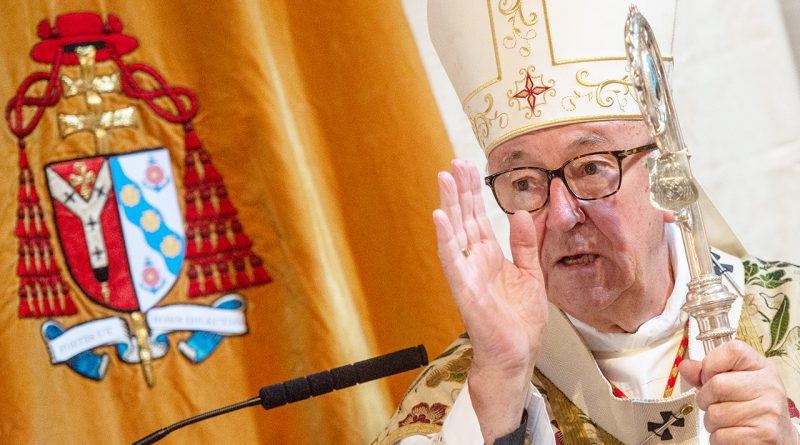“There are two versions of hope worth pondering,” says Cardinal Vincent Nichols in new year reflection
Cardinal Vincent Nichols has released a new year reflection in which he explores the nature of hope and how we should respond in times of uncertainty.
Referring to the difficulties we’ve all experienced over the past year, the Cardinal calls on us to remember the good things that have occurred in bad times.
“We must remember that we constantly see the astonishing goodness, devotion, perseverance and practical wisdom of so many people, made even more evident during the hardships of this last year.
“As we start a new year, we may well ponder why it is that so many people act in such generous ways. I firmly believe that it the promptings of the Holy Spirit, that flow of love pouring out of God, that lies as the deepest source of this service,” the Archbishop of Westminster said.
The Cardinal also emphasised that the many acts of charity seen over the past year has its roots in “the promise of a secure and totally fulfilling future in the presence of God for ever”.
“This is the hope given by the Christian faith and enacted in the birth, life, death and resurrection of Jesus. This hope puts a radically new perspective on today and the days to come, no matter what they bring. This future is secured. Now I can act, in any set of circumstance, with a freedom and generosity which flows forcefully from that promise. This is what saints do”, he said.
Story by Joseph Kelly of www.thecatholicnetwork.co.uk
Picture © Marcin Mazur www.cbcew.org.uk
_________________________________
Here is the full text of the Cardinal’s reflection:
As a new year dawns, we look for hope. Surely this next year can’t be as bad as the one to which we’ve said ‘goodbye’?
There are two versions of hope worth pondering.
One is that hope comes when we can look forward to an uncertain future from the basis of a secure present. The unknown prospects of what is to come do not cause us too much anxiety because we are well equipped to face them – individually and as a society. This is the pragmatic version of the virtue of hope
The second version is a reverse image of the first. Hope is the capacity to face an uncertain present on the basis of an utterly secure future. No matter what happens today or tomorrow, the long-term future is secure because it is promised by something beyond the ebbs and flows of ‘outrageous fortune’. This is the Christian virtue of hope, founded on the promises of God made visible in Jesus, the Christ, whose coming we are celebrating.
These too versions stand on either edge of the stage of life, summoning us to decide where to put our trust. They clarify the fundamental options. The choice we make establishes the direction in which we look, the foundation on which we shape our lives.
But there is a great deal of ‘middle ground’, in which our daily activity takes place.
Prudence demands that we make provision now for future eventualities: insurance and saving schemes, health provision, all we do in preparation for ‘the rainy day’.
Charity demands that we act without counting the cost, putting the present needs of others way ahead of our own current security, acting in a self-sacrificing manner, even going as far as making a gift of our very life itself. This is the story of every true love, told and illustrated again and again, constantly transforming the drama of human living.
Such charity points to its deepest roots, in the promise of a secure and totally fulfilling future in the presence of God for ever. This is the hope given by the Christian faith and enacted in the birth, life, death and resurrection of Jesus. This hope puts a radically new perspective on today and the days to come, no matter what they bring. This future is secured. Now I can act, in any set of circumstance, with a freedom and generosity which flows forcefully from that promise. This is what saints do.
But we must remember that we constantly see the astonishing goodness, devotion, perseverance and practical wisdom of so many people, made even more evident during the hardships of this last year.
As we start a new year, we may well ponder why it is that so many people act in such generous ways. I firmly believe that it the promptings of the Holy Spirit, that flow of love pouring out of God, that lies as the deepest source of this service. It goes beyond self-interest. It is seeking a future beyond the securities of the present, for they have been shaken. It is the privilege of faith to identify and highlight the well-spring of this goodness: the radical hope given in the promises of God.
It is also the source of our joy and the best reason for wishing each other a happy New Year.
Cardinal Vincent Nichols
President, Catholic Bishops’ Conference of England and Wales

